Many proprietary Chinese medicines became a household essential item for members of the public in the battle against COVID-19 amid the fifth wave of the epidemic. Several experts anticipated that Traditional Chinese Medicine (TCM) will play a more important role in Hong Kong’s medical system after this battle.
Bian Zhaoxiang: ICWM Treatment Produces Remarkable Results
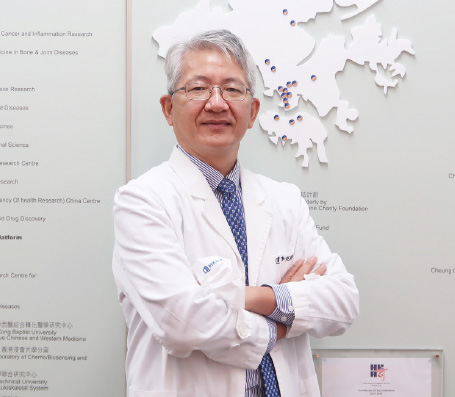
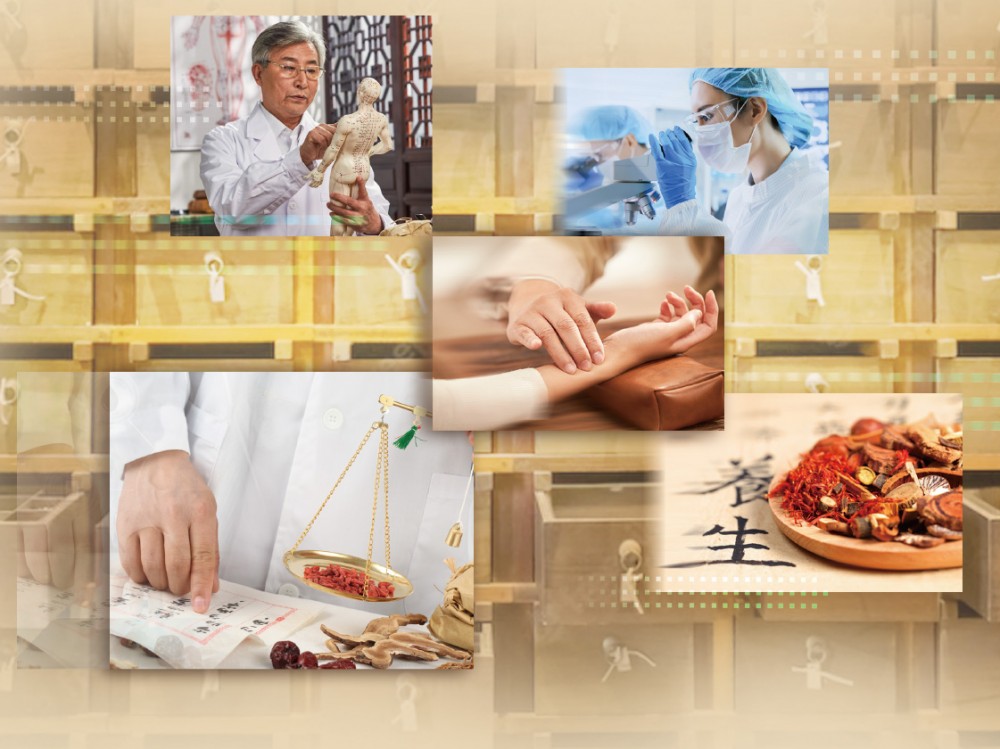 Faced with the onset of the fifth wave of the epidemic, the Government quickly set up several respite centres in various districts to ease the pressure on public hospital beds. Among them, the Kai Tak Holding Centre (KTHC) has begun an unprecedented trial of integrated Chinese-Western medicine (ICWM) treatment. Bian Zhaoxiang, Associate Vice-President (Chinese Medicine Development) of the Hong Kong Baptist University (HKBU) and Director of the Clinical Division of the School of Chinese Medicine of the HKBU, was involved in the work against COVID-19 on the frontline at the KTHC at that time, which is still fresh in his memory.
Faced with the onset of the fifth wave of the epidemic, the Government quickly set up several respite centres in various districts to ease the pressure on public hospital beds. Among them, the Kai Tak Holding Centre (KTHC) has begun an unprecedented trial of integrated Chinese-Western medicine (ICWM) treatment. Bian Zhaoxiang, Associate Vice-President (Chinese Medicine Development) of the Hong Kong Baptist University (HKBU) and Director of the Clinical Division of the School of Chinese Medicine of the HKBU, was involved in the work against COVID-19 on the frontline at the KTHC at that time, which is still fresh in his memory.
“The KTHC has 1,200 beds. It is the first time in Hong Kong’s history that TCM participates in the management of so many beds, and the trial of ICWM treatment is also its first-ever such trial.”
TCM and Western medicine join forces for better results than from sum of their parts
How do TCM and Western medicine work together? Bian explained that a TCM or Western medicine physician will first examine the patient after admission and make a detailed record of the condition. Afterwards, the TCM and Western medicine physicians will exchange opinions and discuss the most appropriate treatment plan. They deepen their understanding through continuous communication and mutual exchange of knowledge, which leads to increasingly fruitful collaboration.
Bian added that another major challenge at that time was that many elderly patients admitted to the KTHC were also suffering from chronic illness, so such illness must be taken into account when treating COVID-19 infection in order to avoid drug conflict. “After having been discharged from the KTHC, many patients found that their other illness had also improved. The KTHC’s experience is invaluable and I am confident that it will inspire the future development of medical care in Hong Kong.”
Witness to two decades of TCM development
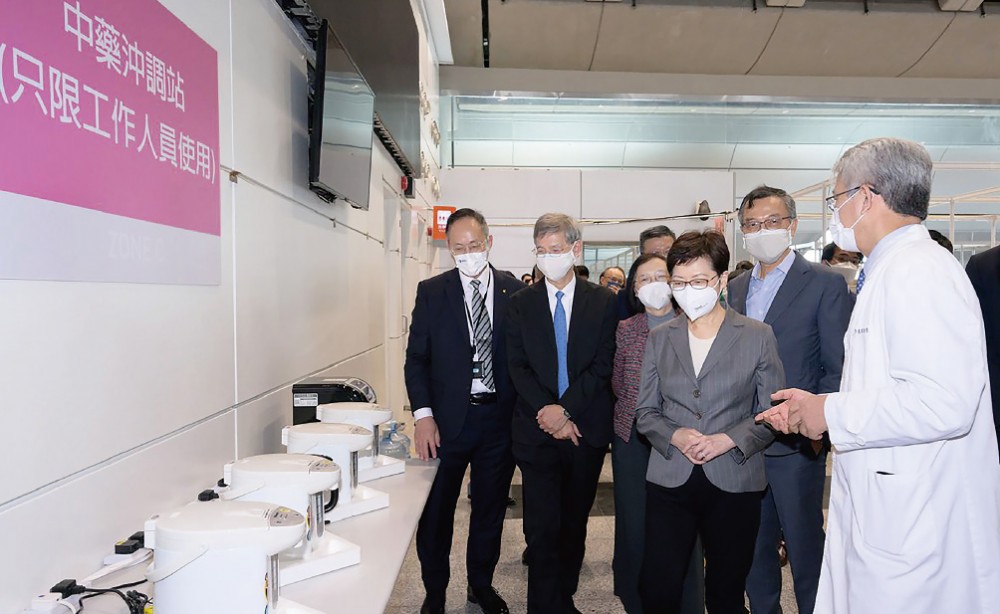 It was no coincidence that the HKBU was invited to participate in the fight against COVID-19. The HKBU launched Hong Kong’s first-ever bachelor’s degree programme in Chinese medicine in 1998. Since then, it has become a major institution of Hong Kong for TCM research. Bian has witnessed the development of TCM in Hong Kong over the course of 20+ years.
It was no coincidence that the HKBU was invited to participate in the fight against COVID-19. The HKBU launched Hong Kong’s first-ever bachelor’s degree programme in Chinese medicine in 1998. Since then, it has become a major institution of Hong Kong for TCM research. Bian has witnessed the development of TCM in Hong Kong over the course of 20+ years.
He recalled that his first task after joining the HKBU was to lead TCM students to Guangzhou for internship. TCM education in Hong Kong was still in its infancy at that time. Later on, it was only after the HKBU broke new ground that Hong Kong’s higher education institutions began to offer bachelor’s and even master’s degree programmes in TCM and Chinese medicines. Since reunification, the Government has gradually increased funding for TCM research, greatly boosting the R&D of TCM and Chinese medicines.
Bian stressed that for the long-term development of TCM, what counts above all is talent training as the students of today are the doctors of tomorrow. “According to statistics, there are currently about 10,553 registered TCM practitioners. This figure is not too far behind the 14,000+ Western medicine doctors, which reflects the growing popularity of TCM. In recent years, young and middle-aged people have accounted for over half of the people who consulted TCM practitioners. This is a very significant change.”
Role of TCM is highly valued
Bian is convinced that TCM will play an increasingly important role in Hong Kong’s medical system for three reasons. Firstly, there is a demand for TCM in Hong Kong. According to previous government statistics, TCM outpatient clinics handled about 16% of outpatients. Secondly, for some diseases, treatment with TCM and Western medicine in fact has complementary effects. For example, for stroke patients, it may be more effective to use TCM acupuncture in combination with Western medicine. Thirdly, the Government has gradually incorporated TCM into the public medical system in recent years. “The development of TCM is bound to flourish on the strength of policy and funding support as the Government pays increasing attention to TCM.”
Tommy Li: Integration of Greater Bay Area Presents New Opportunities for TCM Development
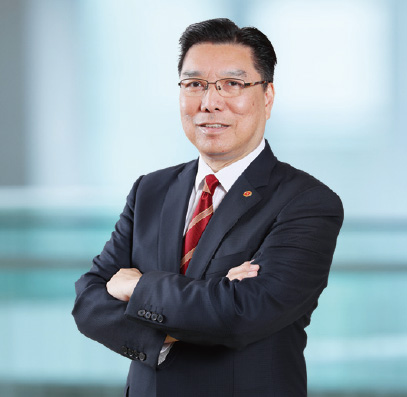
Chinese medicines and TCM are popular among the public
Many Hong Kong residents chose to take proprietary Chinese medicines during the epidemic. The National Health Commission has recommended several Chinese medicines for the treatment of COVID-19 infection, including “Lianhua Qingwen Jiaonang” and “Jinhua Qinggan Keli”, which are well received by the public.
Tommy Li, Vice-Chairman of the Chamber and Chairman of the Federation of the Hong Kong Chinese Medicine Practitioners and Chinese Medicine Traders Association, said that the fifth wave of the epidemic has more patients with mild symptoms. Chinese medicines for external infection can be used for treatment of such cases. Members of the public should choose appropriate proprietary Chinese medicines according to their physical constitution and pay attention to the instructions for the relevant products.
Li added that they can also choose to consult a TCM practitioner directly. “During the epidemic, many groups offered TCM diagnosis and treatment services for home quarantine COVID-19 patients, eg, the Federation of the Hong Kong Chinese Medicine Practitioners and Chinese Medicine Traders Association offered video telephone diagnosis services and special delivery of four days’ dosage of Chinese medicine granules.”
TCM plays a more important role
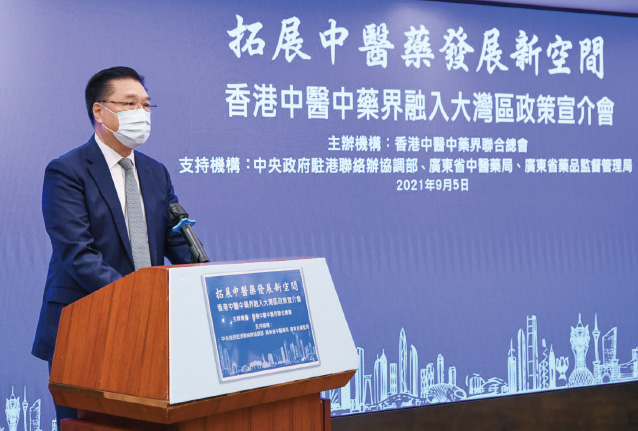 During the fifth wave of the epidemic, the Government piloted the first-ever ICWM treatment programme, which delivered very satisfying results. In Li’s view, TCM and Western medicine each have their own strengths, eg, Western medicine has an edge in cases where severely ill patients need ventilators or other instruments to assist them, or in some emergency situations where surgery has to be performed.
During the fifth wave of the epidemic, the Government piloted the first-ever ICWM treatment programme, which delivered very satisfying results. In Li’s view, TCM and Western medicine each have their own strengths, eg, Western medicine has an edge in cases where severely ill patients need ventilators or other instruments to assist them, or in some emergency situations where surgery has to be performed.
He believes that TCM and Western medicine can be used for integrated treatment, with Western drugs being used to relieve the symptoms and Chinese medicines being used to cure the disease at the source. Patients in critical condition can be treated with Western medicine, and both TCM and Western medicine can be used for integrated treatment after the condition has stabilised.
Members of the public sometimes do not know much about the application of TCM and Chinese medicines due to the lack of publicity. However, having undergone the epidemic ordeal, the Government is placing stronger emphasis on TCM, while public confidence in Chinese medicines has greatly increased. In addition, Hong Kong’s first-ever TCM hospital will be ready by 2025. Therefore, TCM is set to play a more important role in Hong Kong’s future medical system.
Integration of Greater Bay Area boosts development of TCM industry
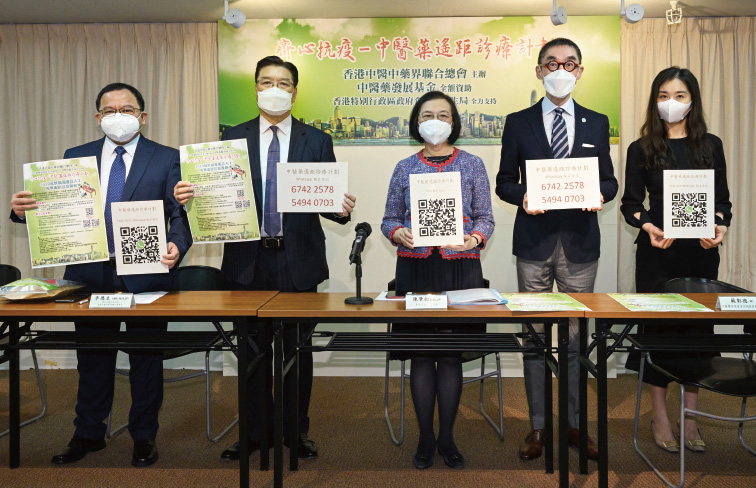 The accelerated integration of the Greater Bay Area will herald new opportunities for the development of Hong Kong’s TCM industry. Li said that as Hong Kong’s NPC deputy, in his proposals to the NPC at the “Two Sessions” every year since 2018, he has been suggesting to simplify the registration process to allow piloting the sales of Hong Kong-registered proprietary Chinese medicines in the Greater Bay Area and to enable Hong Kong’s Iisted Chinese medicine practitioners to practice in the Mainland’s medical system.
The accelerated integration of the Greater Bay Area will herald new opportunities for the development of Hong Kong’s TCM industry. Li said that as Hong Kong’s NPC deputy, in his proposals to the NPC at the “Two Sessions” every year since 2018, he has been suggesting to simplify the registration process to allow piloting the sales of Hong Kong-registered proprietary Chinese medicines in the Greater Bay Area and to enable Hong Kong’s Iisted Chinese medicine practitioners to practice in the Mainland’s medical system.
Li’s suggestions received a response from the country last year when it announced the recruitment of Hong Kong’s TCM practitioners for public medical institutions in the Mainland cities of the Greater Bay Area, as well as the simplification of the Mainland’s registration and approval procedures for Hong Kong’s traditional Chinese medicines for external use. This is indeed a great encouragement for Hong Kong’s TCM industry.
Li believes that the Government should take this opportunity to give more publicity to TCM and Chinese medicines and set up more grassroots TCM services in the 18 districts, while incorporating TCM into the public medical system as soon as possible.




